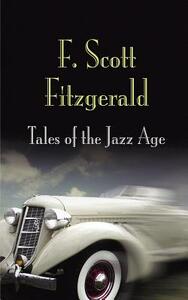Take a photo of a barcode or cover
I can conclude, having finished this collection of short stories, that with the exception of The Great Gatsby, F. Scott Fitzgerald is just not really for me. This collection was saved, in my opinion, by The Diamond as Big as the Ritz, Porcelain and Pink, and Jemina the Mountain Girl. Barring some moments of subtle but shocking endings, I found the rest of the stories dull, and the characters empty, and the prose ineffective.
This is the better of Fitzgerald's 2 early collections. It has a couple of stinkers at the end, but most of the stories feel surprisingly fresh and lovely even today.
So many gems (figuratively and literally) of stories in there.
I enjoyed The Curious Case Of Benjamin Button and Babylon Revisited but the others were a bit boring.
Some of these short stories were ordinary, one I detested and others were downright strange. No more F. Scott Fitzgerald for me!
Fitzgerald wrote Gatsby, let's remember that - but I have to admit that whatever genius there was hidden within these particular pages, it went completely over my head. I couldn't understand most of the contextual irony or humour, or sometimes even figure out the message of the stories. My least favourite was 'Head and Shoulders' but the title story 'The Curious Case of Benjamin Button' was almost as equally disappointing. However, I am no expert on American literature.
As a fan, however, I will say this: throughout these short stories I continued to love the way Fitzgerald exposes the supposed flaws of women (indecisiveness, bossiness, etc.) in his female characters. Despite possessing these negative attributes, overall the women are still somehow portrayed as beautiful creatures to be envied and sought after. That's where his genius lies - and that's what I loved most about Daisy, for example, in Gatsby.
I hate third person, anyway.
As a fan, however, I will say this: throughout these short stories I continued to love the way Fitzgerald exposes the supposed flaws of women (indecisiveness, bossiness, etc.) in his female characters. Despite possessing these negative attributes, overall the women are still somehow portrayed as beautiful creatures to be envied and sought after. That's where his genius lies - and that's what I loved most about Daisy, for example, in Gatsby.
I hate third person, anyway.
I'll be honest - I didn't finish this. I still added it just 'cause I only wanted to read The Curious Case Of Benjamin Button anyway and I DID finish that story, and the second one. But when I got half-way through the third I couldn't cope anymore an had to stop. Benjamin Button was good. It was really good actually. But the rest (or at least what I did read of it) were just awful. Maybe they're just not my thing, I don't know. But that's my excuse for not finishing.
This had some more than decent short stories and some very disappointing ones. F. Scott Fitzgerald is difficult to read because of how racist and sexist he was, and this collection demonstrates both -isms throughout. Still, certain stories, including "The Curious Case of Benjamin Button" and "The Lees of Happiness", were fresh and original and fun to read.
The remarkable story "THE CURIOUS CASE OF BENJAMIN BUTTON" is even better then the movie which was made based on this story.
This story was inspired by a remark of Mark Twain's to the effect that it was a pity that the best part of life came at the beginning and the worst part at the end. By trying the experiment upon only one man in a perfectly normal world I have scarcely given his idea a fair trial. Several weeks after completing it, I discovered an almost identical plot in Samuel Butler's "Note-books."
The story was published in "Collier's" last summer and provoked this startling letter from an anonymous admirer in Cincinnati:
"Sir—
I have read the story Benjamin Button in Colliers and I wish to say that as a short story writer you would make a good lunatic I have seen many peices of cheese in my life but of all the peices of cheese I have ever seen you are the biggest peice. I hate to waste a piece of stationary on you but I will."
Free download available at Project Gutenberg.
This story was inspired by a remark of Mark Twain's to the effect that it was a pity that the best part of life came at the beginning and the worst part at the end. By trying the experiment upon only one man in a perfectly normal world I have scarcely given his idea a fair trial. Several weeks after completing it, I discovered an almost identical plot in Samuel Butler's "Note-books."
The story was published in "Collier's" last summer and provoked this startling letter from an anonymous admirer in Cincinnati:
"Sir—
I have read the story Benjamin Button in Colliers and I wish to say that as a short story writer you would make a good lunatic I have seen many peices of cheese in my life but of all the peices of cheese I have ever seen you are the biggest peice. I hate to waste a piece of stationary on you but I will."
Free download available at Project Gutenberg.


